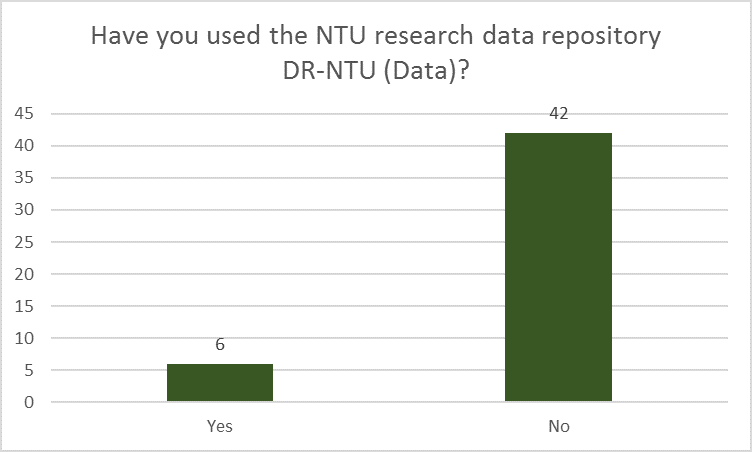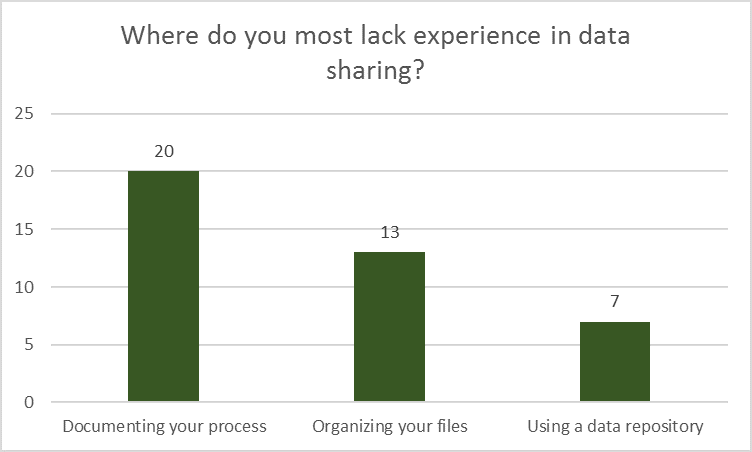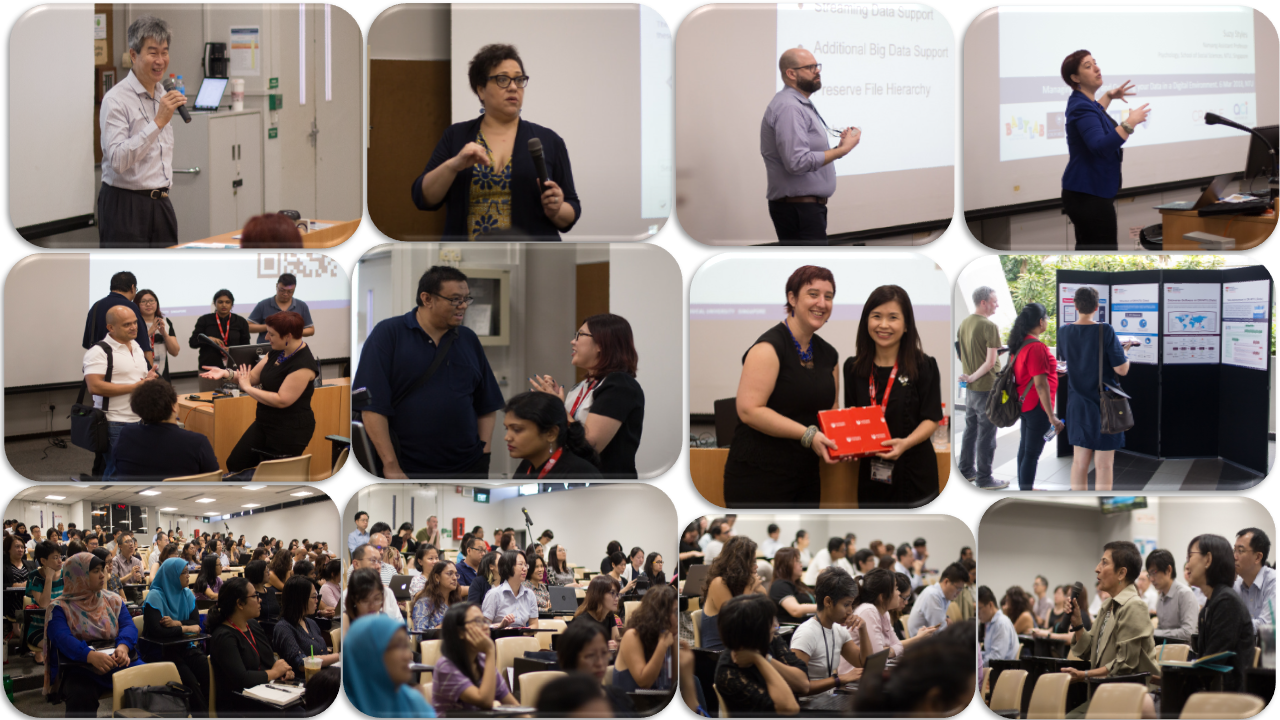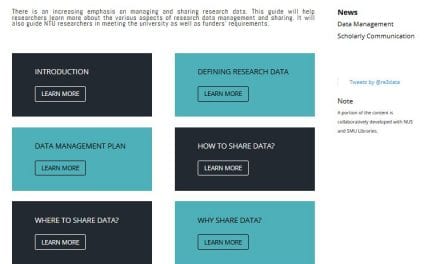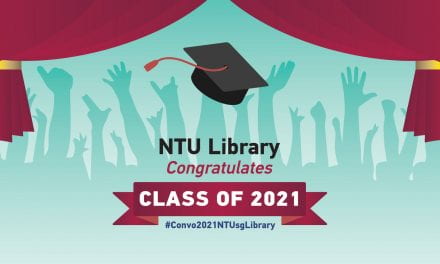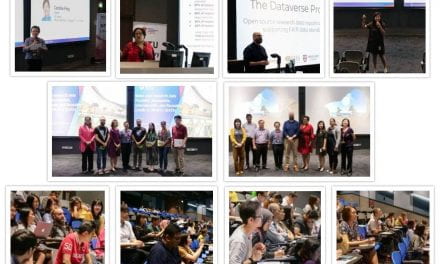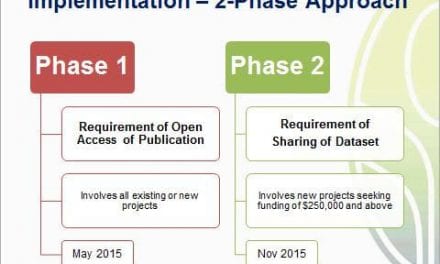On 6th March 2018, around 110 NTU faculty, research staff and postgraduate students from various faculties and departments congregated at LT5 to learn more about research data management and the use of the NTU research data repository.
The seminar began with an opening address by the Deputy Associate Provost (Information & Knowledge), Professor Schubert Foo, who shared that good research data management and sharing is an essential deliverable of researchers, not just to fulfil obligations towards the institution or funders, but also for advancement of science as well as for themselves in the long term. The first speaker, Sonia Barbosa, Manager of Data Curation, Institute of Quantitative Social Science Dataverse, Harvard University emphasised the need to include codes, supplementary documentation, equipment and software information, etc. to allow datasets to be reusable and experiments to be replicable by others. She shared success stories of how well-curated open research data could help in visibility and help other researchers to reuse the datasets. Second speaker, Danny, Dataverse Development Project Manager, Harvard University, got the audience pretty excited on the upcoming useful Dataverse functions and upgrades. Examples include additional file handling options, preserving of file hierarchy, embargo, data exploration and visualisation, importing and exporting data options.
Third speaker, Nanyang Assistant Professor Suzy Styles, inspired the audience with her energetic presentation on her Open Science and open research data sharing experiences. She presented how she made use of the data citation and DOIs for her datasets in her sub-dataverses in DR-NTU (Data) in her research resume.
If you would like to find out more on what was covered by the speakers and the questions that were posed by the audience and slido, check the links below:
Presentations by speakers:
- NULLIUS IN VERBA: “Take nobody’s word for it” by Sonia Barbosa, Manager of Data Curation, Harvard Dataverse & Danny Brooke, Dataverse Development Project Manager, Harvard Dataverse
- Notes on the Open Science Ecosystem by Nanyang Asst Prof Suzy Styles (NTU School of Social Sciences)
- Is it compulsory to deposit all research data in the NTU research data repository?
- The benefits this framework will bring to NTU, specifically, how your research data is currently managed today and how this framework will improve things?
- Is this framework developed specifically for STEM research data or does it also include Social Science and Humanities Research data?
- Are plans to collaborate with other unis to enable open access research data sharing?
- On research data sharing, do you have plans to share with other public and private sector researchers?
- One way to promote good data management practices and project team collaboration is using ELN or electronic lab notebook. This allows the capturing, storing and sharing of data from the point of its creation. Is there any ELN application that has successfully integrated with DataVerse?
- What is the difference between depositing in NTU Dataverse vs Researchgate sharing?
- Does DR-NTU allow submissions for gigabytes even terrabytes of data? Say, when producing tons of simulation data, shall we submit it, or just enough the codes to run the simulation?
- Could you share more about how citation works in the case of data. Where are the citation gathered?
- Can anyone use the datasets in the data repository for coursework?
- How can we protect honest researchers from unethical practices by teammates and other researchers in the same place?
- One reason some researchers do not want to share their data is that they don’t think the data is valuable to any other researchers besides supporting their own research. How can we convince them? On the other hand, sharing data demand resources. Is it worth it in such cases?
- If I share data on dr-ntu, how will others who don't use dr-ntu or beyond ntu find my data?
- In the process of publication (from manuscript submission to manuscript acceptance), when is the best timing to share data and to include the DOI link to the dataverse in the publication?
- If I left NTU, what happens to my submitted data?
- What if publication has been submitted and then the data shared later? Is there a way to request the publisher to insert the data link, so that we can have bi-directional linking?
- If my institution doesn't have dataverse or such repository, how can I share my data?
- Last time i got problems uploading a folder to DR-NTU.. it automatically produces subfolders in the folder
- If I currently hold a dataverse account with NTU and store my data on NTU data repository, but leave to join another institution in another country without dataverse, what happens to my dataverse account and the data I've shared so far? How should I continue sharing data?
- Will the data inside this platform be discoverable in Google or Google Scholar?
- Do we still have access to manage our shared data on DR-NTU if we are longer NTU staff?
- Some faculty want control over who they share their data, and prefer not to make it open access. How to convince them otherwise?
- Is the unlicensed data in Harvard business school data verse open access?
- Where r the server's located for the data held in dr-ntu?
- I might still want to do something with the data..one day
- Use of DR across institutions and highly interdisciplinary, collaborative teams.
- Poaching of data for easy publications
- Troublesome with metadata entries
- Changing mindsets on data sharing
- How to share it and in which formats so on
- Questioning data to discredit author
- Noise of data
- Credits and ownership
- Using the portal, learning how to share.
- Poor planning, mindset change, and habits
- Changing the culture here in Singapore – my colleagues don't even want to share data with each other let alone the university or wider public. You can label that small minded but that is the culture here.
- Data sharing not in researcher workflow
- Poor incentive for researchers but lots of work
- Security and data ownership
- Buy in from researchers
- Buy in
- Sharing of sensitive information of vulnerable groups and patient groups
- Data structure
- Cleaning data
- Ownership
- Security
- Budgets and resources
- Convincing researchers to share their data
- How will people find my data outside ntu?
- Misuse of data without credit.
- Confidentiality when sharing with 3rd party collaboration teams
- Confidentiality issues
- Buy in from researchers
- Tidying the data
- Data ownership
- Confidentiality & Informed Consent
- Ensuring proper citation / creditation
- Security and Storage Space


